北师大版(2019)选择性必修第二册 Unit 5 Education Lesson 3 课件(共20张PPT)
文档属性
| 名称 | 北师大版(2019)选择性必修第二册 Unit 5 Education Lesson 3 课件(共20张PPT) |
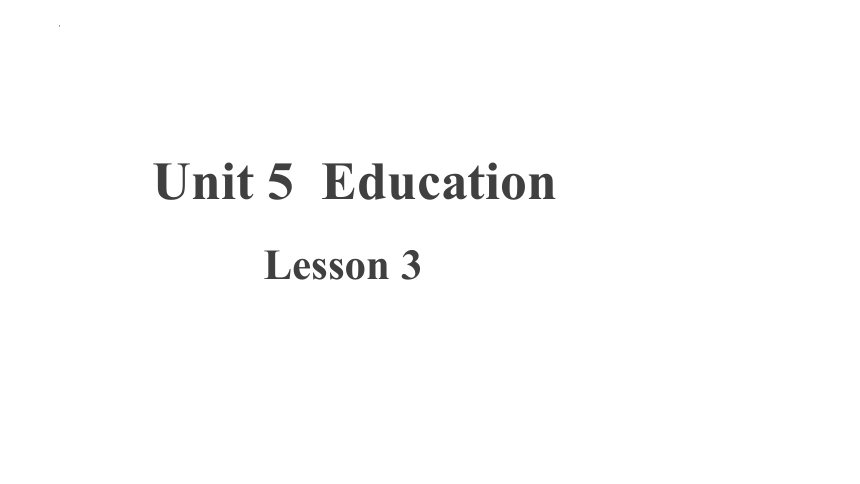
|
|
| 格式 | zip | ||
| 文件大小 | 8.8MB | ||
| 资源类型 | 教案 | ||
| 版本资源 | 北师大版(2019) | ||
| 科目 | 英语 | ||
| 更新时间 | 2022-12-28 00:00:00 | ||
图片预览

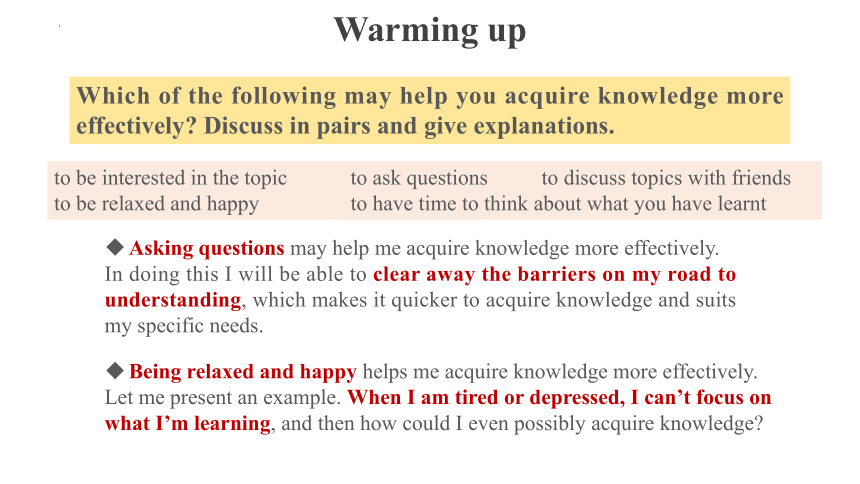
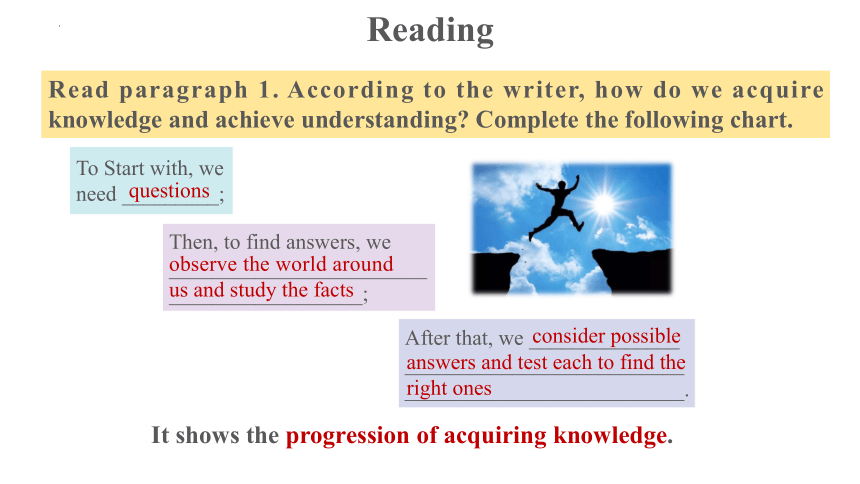
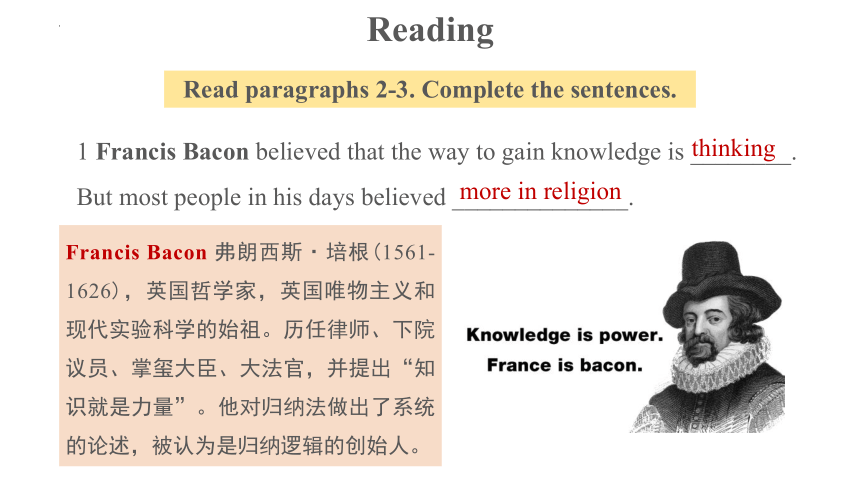
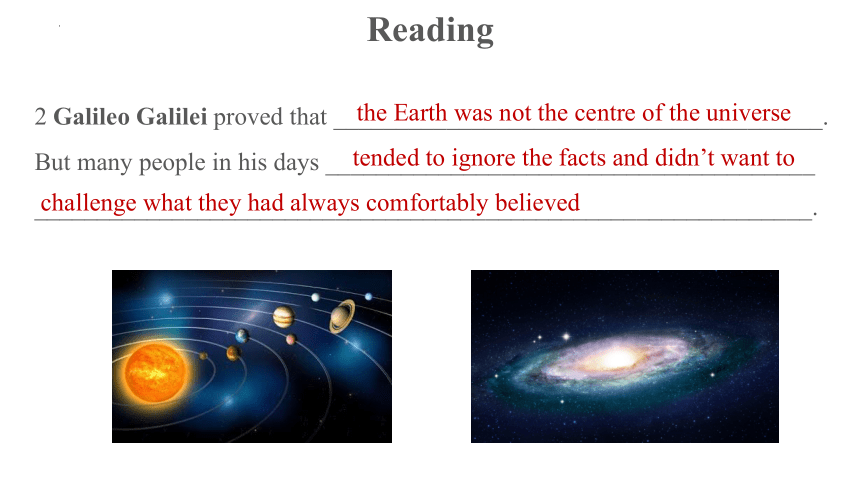
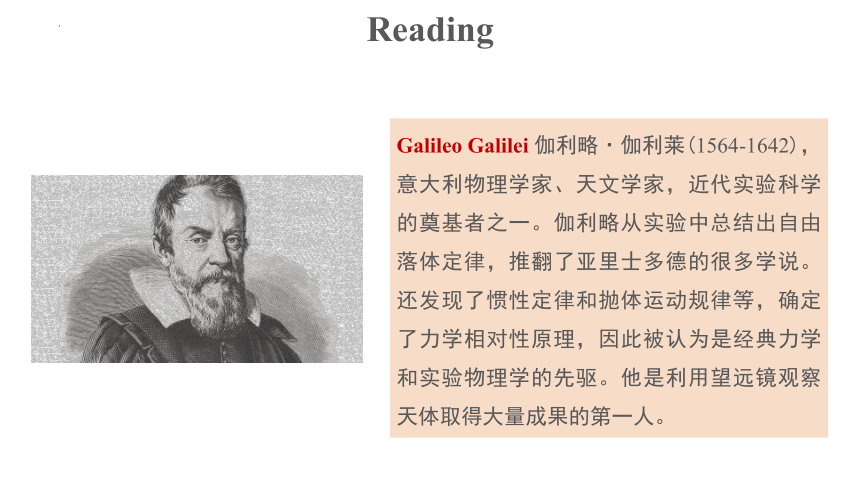
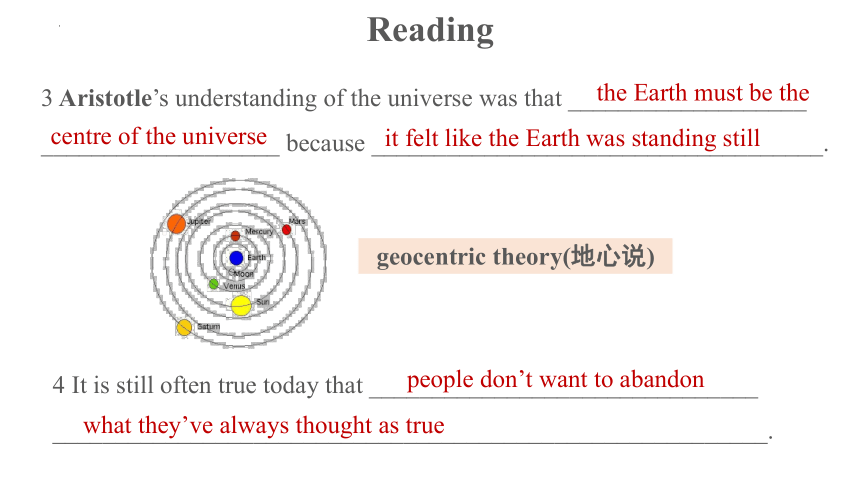
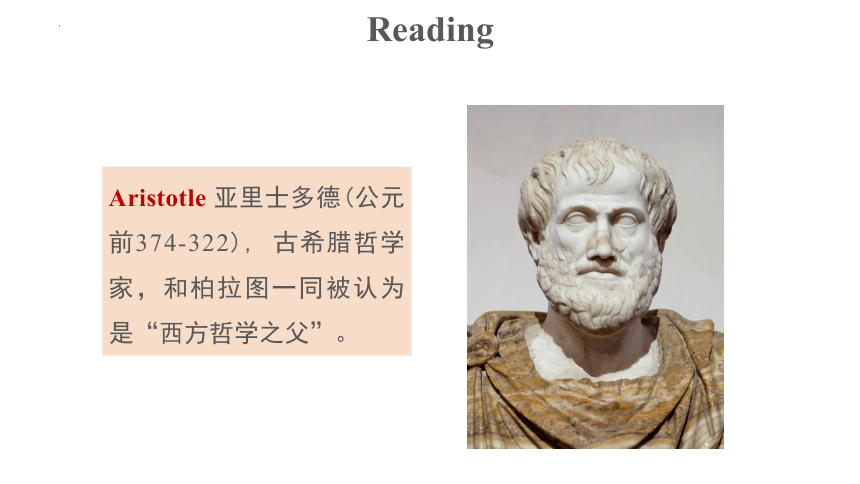
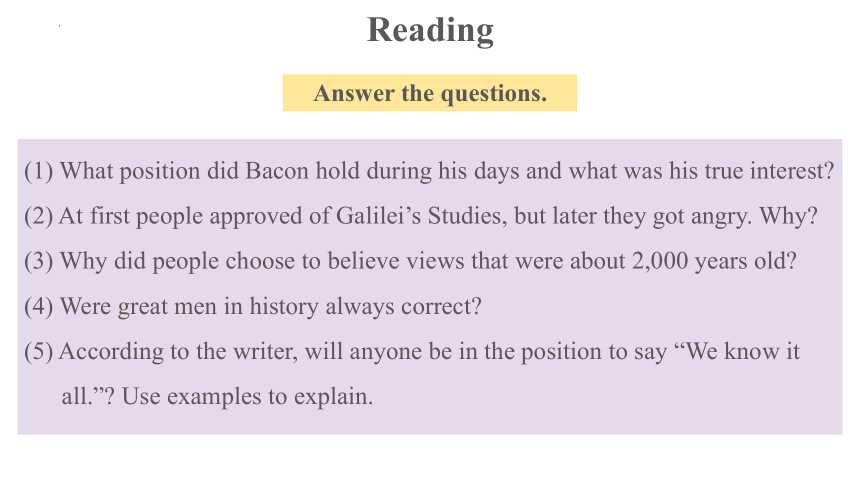
文档简介
(共20张PPT)
Unit 5 Education
Lesson 3
Warming up
Which of the following may help you acquire knowledge more effectively Discuss in pairs and give explanations.
to be interested in the topic
to be relaxed and happy
to ask questions to discuss topics with friends
to have time to think about what you have learnt
Asking questions may help me acquire knowledge more effectively.
In doing this I will be able to clear away the barriers on my road to understanding, which makes it quicker to acquire knowledge and suits my specific needs.
Being relaxed and happy helps me acquire knowledge more effectively.
Let me present an example. When I am tired or depressed, I can’t focus on what I’m learning, and then how could I even possibly acquire knowledge
Read paragraph 1. According to the writer, how do we acquire knowledge and achieve understanding Complete the following chart.
To Start with, we need _________;
Then, to find answers, we __________________________________________;
After that, we ______________
____________________________________________________.
It shows the progression of acquiring knowledge.
Reading
questions
observe the world around us and study the facts
consider possible
answers and test each to find the right ones
Read paragraphs 2-3. Complete the sentences.
1 Francis Bacon believed that the way to gain knowledge is ________. But most people in his days believed ______________.
Reading
thinking
more in religion
Francis Bacon 弗朗西斯·培根(1561-1626),英国哲学家,英国唯物主义和现代实验科学的始祖。历任律师、下院议员、掌玺大臣、大法官,并提出“知识就是力量”。他对归纳法做出了系统的论述,被认为是归纳逻辑的创始人。
2 Galileo Galilei proved that _______________________________________. But many people in his days _______________________________________
______________________________________________________________.
the Earth was not the centre of the universe
tended to ignore the facts and didn’t want to
challenge what they had always comfortably believed
Reading
Galileo Galilei 伽利略·伽利莱(1564-1642),意大利物理学家、天文学家,近代实验科学的奠基者之一。伽利略从实验中总结出自由落体定律,推翻了亚里士多德的很多学说。还发现了惯性定律和抛体运动规律等,确定了力学相对性原理,因此被认为是经典力学和实验物理学的先驱。他是利用望远镜观察天体取得大量成果的第一人。
Reading
3 Aristotle’s understanding of the universe was that ___________________
___________________ because ____________________________________.
geocentric theory(地心说)
Reading
it felt like the Earth was standing still
the Earth must be the
centre of the universe
4 It is still often true today that _______________________________
_________________________________________________________.
people don’t want to abandon
what they’ve always thought as true
Aristotle 亚里士多德(公元前374-322), 古希腊哲学家,和柏拉图一同被认为是“西方哲学之父”。
Reading
Answer the questions.
(1) What position did Bacon hold during his days and what was his true interest
(2) At first people approved of Galilei’s Studies, but later they got angry. Why
(3) Why did people choose to believe views that were about 2,000 years old
(4) Were great men in history always correct
(5) According to the writer, will anyone be in the position to say “We know it
all.” Use examples to explain.
Reading
(1) What position did Bacon hold during his days and what was his true interest
Bacon held an important rank under King James (1566-1625) of England.
His true interest was the worthy search for knowledge.
(2) At first people approved of Galilei’s Studies, but later they got angry. Why
Because they didn’t want to abandon what they had always thought was true.
(3) Why did people choose to believe views that were about 2,000 years old
Because they were unwilling to challenge what they had always comfortably believed.
Reading
(4) Were great men in history always correct Give examples.
No. Galilei made mistakes. He believed that the Earth moved round
the sun in a perfect circle. But he was wrong.
(5) According to the writer, will anyone be in the position to say
“We know it all.” Use examples to explain.
None of us can say “we know it all”. Bacon and Galilei knew that
knowledge and understanding are things to fight for.
Reading
Find out what each pronoun refers to in the text.
Understanding Coherence in Context
The repetition (重复) of key terms or phrases makes meaning coherent (有条理的) in a text.
The use of synonyms (近义词) and antonyms (反义词) helps enhance coherence (连贯性) in a text.
Linking words such as since, so, afterwards, then, although, but, however, etc. can help connect meaning in sentences.
Pronouns such as he, she, it, they, etc. help carry meaning on into the next point in a text.
Reading
Example After that, we consider possible answers and test each to find the right ones. (Para. 1) ones=answers
1 … he was going against the views of the day. (Para. 2) he = ______________
2 This was certainly not the interest … (Para. 2) This = ___________________
3 … what they had always comfortably believed. (Para.2) they = _______________________________
4 … they grew angry and put him in prison. (Para. 3) they = ______________
5 … then it must be so. (Para. 3) it = ____________
6 He is now know as … (Para. 3) He = _____________
Reading
Francis Bacon
search for knowledge
the church and most people
assumption
people
Galilei
Circle the linking words in the text that the writer used in order to express his/her opinion coherently.
To start with, we need questions. Then, to find answers, we observe the world around us and study the facts. After that, we consider possible answers and test each to find the right ones. (L2)
However, in the 17th century when Francis Bacon (1561-1626) suggested that this type of thinking was the way to gain knowledge … (L12)
At that time, people believed more in the church than in facts … (L17)
At first, people approved of his studies and urged him to continue, but later when he proved Aristotle wrong, they grew angry and put him in prison. (L33)
Therefore, our understanding of the world around us is constantly growing and changing. In other words, we learn more every day and none of us can ever sit back and say, “We know it all.” (L42)
Reading
Think and share.
(1) What do you think the last sentence of the passage means
Reading
I think the last sentence of the text means that knowledge and understanding are more important than money. They are more helpful and useful because they can guide our ways of learning about the world and help us solve problems all the time while money can just buy certain goods and solve problems for some time.
Reading
(2) What is the writer’s attitude towards the way to acquire knowledge
How did the writer make his/her opinion clear to the readers
Underline the expressions that show the writer’s attitude.
The writer’s attitude to acquiring knowledge is to keep asking questions and respect facts. We do not just accept answers from authority;
The writer illustrated his/her points by using examples of Galilei and ideas from great thinkers like Bacon;
The expressions that show the writer’s attitudes are like: it seems obvious, luckily for us, however, it is not surprising, primitive ideas, it felt like, make the assumption, was wrong at time, sit back and say, a world with questions, owe so much … to, step out from the shadow, to find the kingdom of knowledge, more vital to, more beneficial to …
The following sentences all contain false information. Use the words and phrases below to correct them.
1 In Bacon’s days, the working style of the government was very efficient.
In Bacon’s days, the working style of the government was very inefficient.
2 People were strongly against Galilei’s studies at first and then they urged him to give up.
People approved of Galilei’s studies at first and then they urged him to give up.
inefficient approve of didn’t want to
abandon constantly growing and changing continue
Practice
3 Our understanding of the world is stable.
Our understanding of the world is constantly growing and changing.
4 People in the past were willing to give up what they had always thought as true.
People in the past didn’t want to abandon what they had always thought as true.
Practice
inefficient approve of didn’t want to
abandon constantly growing and changing continue
Assignment
Look at the three critical thinking questions below. Prepare at least two more questions you can ask about this passage. Then ask and answer the questions in groups.
(1) Why did the writer write this passage
(2) How do I know what I’m reading is true
(3) What is the relationship between the ideas in the text
Goodbye!
Unit 5 Education
Lesson 3
Warming up
Which of the following may help you acquire knowledge more effectively Discuss in pairs and give explanations.
to be interested in the topic
to be relaxed and happy
to ask questions to discuss topics with friends
to have time to think about what you have learnt
Asking questions may help me acquire knowledge more effectively.
In doing this I will be able to clear away the barriers on my road to understanding, which makes it quicker to acquire knowledge and suits my specific needs.
Being relaxed and happy helps me acquire knowledge more effectively.
Let me present an example. When I am tired or depressed, I can’t focus on what I’m learning, and then how could I even possibly acquire knowledge
Read paragraph 1. According to the writer, how do we acquire knowledge and achieve understanding Complete the following chart.
To Start with, we need _________;
Then, to find answers, we __________________________________________;
After that, we ______________
____________________________________________________.
It shows the progression of acquiring knowledge.
Reading
questions
observe the world around us and study the facts
consider possible
answers and test each to find the right ones
Read paragraphs 2-3. Complete the sentences.
1 Francis Bacon believed that the way to gain knowledge is ________. But most people in his days believed ______________.
Reading
thinking
more in religion
Francis Bacon 弗朗西斯·培根(1561-1626),英国哲学家,英国唯物主义和现代实验科学的始祖。历任律师、下院议员、掌玺大臣、大法官,并提出“知识就是力量”。他对归纳法做出了系统的论述,被认为是归纳逻辑的创始人。
2 Galileo Galilei proved that _______________________________________. But many people in his days _______________________________________
______________________________________________________________.
the Earth was not the centre of the universe
tended to ignore the facts and didn’t want to
challenge what they had always comfortably believed
Reading
Galileo Galilei 伽利略·伽利莱(1564-1642),意大利物理学家、天文学家,近代实验科学的奠基者之一。伽利略从实验中总结出自由落体定律,推翻了亚里士多德的很多学说。还发现了惯性定律和抛体运动规律等,确定了力学相对性原理,因此被认为是经典力学和实验物理学的先驱。他是利用望远镜观察天体取得大量成果的第一人。
Reading
3 Aristotle’s understanding of the universe was that ___________________
___________________ because ____________________________________.
geocentric theory(地心说)
Reading
it felt like the Earth was standing still
the Earth must be the
centre of the universe
4 It is still often true today that _______________________________
_________________________________________________________.
people don’t want to abandon
what they’ve always thought as true
Aristotle 亚里士多德(公元前374-322), 古希腊哲学家,和柏拉图一同被认为是“西方哲学之父”。
Reading
Answer the questions.
(1) What position did Bacon hold during his days and what was his true interest
(2) At first people approved of Galilei’s Studies, but later they got angry. Why
(3) Why did people choose to believe views that were about 2,000 years old
(4) Were great men in history always correct
(5) According to the writer, will anyone be in the position to say “We know it
all.” Use examples to explain.
Reading
(1) What position did Bacon hold during his days and what was his true interest
Bacon held an important rank under King James (1566-1625) of England.
His true interest was the worthy search for knowledge.
(2) At first people approved of Galilei’s Studies, but later they got angry. Why
Because they didn’t want to abandon what they had always thought was true.
(3) Why did people choose to believe views that were about 2,000 years old
Because they were unwilling to challenge what they had always comfortably believed.
Reading
(4) Were great men in history always correct Give examples.
No. Galilei made mistakes. He believed that the Earth moved round
the sun in a perfect circle. But he was wrong.
(5) According to the writer, will anyone be in the position to say
“We know it all.” Use examples to explain.
None of us can say “we know it all”. Bacon and Galilei knew that
knowledge and understanding are things to fight for.
Reading
Find out what each pronoun refers to in the text.
Understanding Coherence in Context
The repetition (重复) of key terms or phrases makes meaning coherent (有条理的) in a text.
The use of synonyms (近义词) and antonyms (反义词) helps enhance coherence (连贯性) in a text.
Linking words such as since, so, afterwards, then, although, but, however, etc. can help connect meaning in sentences.
Pronouns such as he, she, it, they, etc. help carry meaning on into the next point in a text.
Reading
Example After that, we consider possible answers and test each to find the right ones. (Para. 1) ones=answers
1 … he was going against the views of the day. (Para. 2) he = ______________
2 This was certainly not the interest … (Para. 2) This = ___________________
3 … what they had always comfortably believed. (Para.2) they = _______________________________
4 … they grew angry and put him in prison. (Para. 3) they = ______________
5 … then it must be so. (Para. 3) it = ____________
6 He is now know as … (Para. 3) He = _____________
Reading
Francis Bacon
search for knowledge
the church and most people
assumption
people
Galilei
Circle the linking words in the text that the writer used in order to express his/her opinion coherently.
To start with, we need questions. Then, to find answers, we observe the world around us and study the facts. After that, we consider possible answers and test each to find the right ones. (L2)
However, in the 17th century when Francis Bacon (1561-1626) suggested that this type of thinking was the way to gain knowledge … (L12)
At that time, people believed more in the church than in facts … (L17)
At first, people approved of his studies and urged him to continue, but later when he proved Aristotle wrong, they grew angry and put him in prison. (L33)
Therefore, our understanding of the world around us is constantly growing and changing. In other words, we learn more every day and none of us can ever sit back and say, “We know it all.” (L42)
Reading
Think and share.
(1) What do you think the last sentence of the passage means
Reading
I think the last sentence of the text means that knowledge and understanding are more important than money. They are more helpful and useful because they can guide our ways of learning about the world and help us solve problems all the time while money can just buy certain goods and solve problems for some time.
Reading
(2) What is the writer’s attitude towards the way to acquire knowledge
How did the writer make his/her opinion clear to the readers
Underline the expressions that show the writer’s attitude.
The writer’s attitude to acquiring knowledge is to keep asking questions and respect facts. We do not just accept answers from authority;
The writer illustrated his/her points by using examples of Galilei and ideas from great thinkers like Bacon;
The expressions that show the writer’s attitudes are like: it seems obvious, luckily for us, however, it is not surprising, primitive ideas, it felt like, make the assumption, was wrong at time, sit back and say, a world with questions, owe so much … to, step out from the shadow, to find the kingdom of knowledge, more vital to, more beneficial to …
The following sentences all contain false information. Use the words and phrases below to correct them.
1 In Bacon’s days, the working style of the government was very efficient.
In Bacon’s days, the working style of the government was very inefficient.
2 People were strongly against Galilei’s studies at first and then they urged him to give up.
People approved of Galilei’s studies at first and then they urged him to give up.
inefficient approve of didn’t want to
abandon constantly growing and changing continue
Practice
3 Our understanding of the world is stable.
Our understanding of the world is constantly growing and changing.
4 People in the past were willing to give up what they had always thought as true.
People in the past didn’t want to abandon what they had always thought as true.
Practice
inefficient approve of didn’t want to
abandon constantly growing and changing continue
Assignment
Look at the three critical thinking questions below. Prepare at least two more questions you can ask about this passage. Then ask and answer the questions in groups.
(1) Why did the writer write this passage
(2) How do I know what I’m reading is true
(3) What is the relationship between the ideas in the text
Goodbye!
同课章节目录
- Unit 4 Humour
- Lesson 1 What’s So Funny?
- Lesson 2 Why Do We Need Humour?
- Lesson 3 My Favourite Comedian
- Unit 5 Education
- Lesson 1 Enlightening a Mind
- Lesson 2 The Objectives of Education
- Lesson 3 Understanding
- Unit 6 The Media
- Lesson 1 From Page to Screen
- Lesson 2 Questions about Media
- Lesson 3 The Advertising Game
